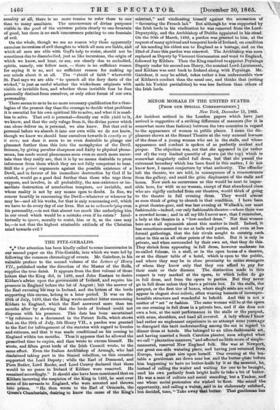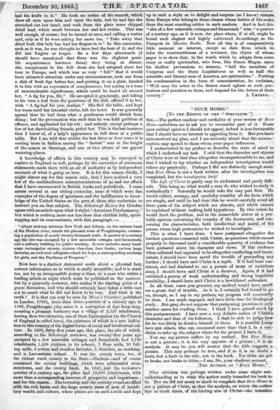New York, December 15, 1865. AN incident noticed in the
London papers which have just arrived is suggestive of a striking difference of manners (for it is somewhat more than fashion) between the two countries in regard to the appearance of women in public places. I mean the dis- pleasure shown at the Strand Theatre at the very unusual lowness. of the dress of a young woman who sat in the stalls, and whose appearance and conduct is spoken of as perfectly modest and proper. The objection was, not that she appeared in (or rather out of) the very limited quantity of gown (at the top) which is somewhat singularly called full dress, but that she passed the extremest boundary which has been fixed in this matter, I do not know how, I cannot conjecture by what authority. The offender left the theatre, we are told, in consequence of a remonstrance from the gallery, and amid the grim displeasure of the stalls and boxes. Now such an occurrence as this would be next to impos- sible here, for with us no woman, except of that abandoned class who are rigidly excluded from our theatres, would think of going to the theatre in full evening dress. They would almost as soon think of going to church in that condition. I have been a great theatre-goer, and was last evening at Wallack's, our most fashionable—indeed, our only fashionable theatre—where there was a crowded house ; and in all my life I never saw, that I remember, a lady at the theatre in a "low-necked dress." Not that women here are at all squeamish about this matter in itself. Indeed, it has sometimes seemed to me at balls and parties, and even at less formal gatherings, that the fair rivals sought to outstrip each. other in this as in all other points of the toilet. But it is only in private, and when surrounded by their own set, that they do this.. They shrink from appearing in full dress, however moderate its. so-called fulness, iu a stall, or in the open boxes of a theatre, or at the dinner table of a hotel, which is open to the public, and where they may be in close proximity to entire strangers of whom they know only that they can afford to pay for their seats or their dinners. The distinction made in this respect is very marked at the opera, to which ladies do go in full dress, and from the opera to parties. But they never go in full dress unless they have a private box. In the stalls, the parquet, or the first tier of boxes, where single seats are sold, they appear in elegant demi-toilette, often wearing bonnets of incompre- hensible structure and wonderful to behold. And this is not a matter of " set " or fashion. The same woman will be at the opera on one evening in full dress in a private box, and if she does not own a box, at the next performance in the stalls or the parquet, with arms, shoulders, and head all covered. A lady whom I knew had rather an unpleasant experience in an attempt some years ago to disregard this tacit understanding among the sex in regard to, dinner dress at hotels. She belonged to an ultra-fashionable set, and having married a South Carolina planter, soon adopted what we call " plantation manners," and affected no little scorn of simple - mannered, reserved New England folk. She was at Newport, our great sea-side watering place, and having just returned from. Europe, took great airs upon herself. One evening at the tea- table a gentleman sat down near her, and the butter-plate before him happening to have no butter-knife by it at the moment, he, instead of calling the waiter and waiting for one to be brought, used his own perfectly fresh bright knife to take a bit of butter.
He was a man of culture and social standing, but a Yankee, and one whose social pretension she wished to flout. She seized the opportunity, and calling a waiter, said in an elaborately subdued, but decided, tone, " Take away that butter. That gentleman has had his knife in it." He took no notice of the remark, which drew all eyes upon him and upon the lady, but by and bye she stretched out her hand, and took from the plate some chipped dried beef, which stood between her and her victim. This was well enough, of course; but he turned at once, and calling a waiter said, only as if be were asking for more tea, "Take away that dried beef, this lady has had her fingers in it." In this encounter, such as it was, he was thought to have had the beat of it, and she did not forgive or forget. So a few days afterwards (I should have mentioned that there was the slightest possi- ble acquaintance between them) they being at dinner, she, conspicuous in the full dress she had adopted since her tour to Europe, and which was so very " full" that it would have attracted attention under any circumstances, took one from a dish of fresh figs before her, and putting it on a plate, handed it to him with an expression of complaisance, but saying in a tone of unmistakeable significance, which could be heard all around her, " A fig for you, Sir." He accepted it graciously, and taking in his turn a leaf from the garniture of the dish, offered it to her, with " A fig-leaf for you, madam." She fled the table, and kept her room until her intended victim left the hotel. It was generally agreed that he had done what a gentleman would shrink from doing ; but the provocation was such that he was held guiltless of offence, and applauded for his wit ; and nobody, except perhaps a few of her slaveholding friends, pitied her. This is the last instance that I know of, of a lady's appearance in full dress at a public table. But I am told that within the last three or four years it is coming more in fashion among the " fastest" seta at the height of the season at Saratoga, and one or two others of our gayest watering-places.
A knowledge of affairs in this country may be conveyed to readers in England as well, perhaps, by, the correction of erroneous statements made there with an air of authority as by independent accounts of what is going on here. It is for this reason chiefly, I might almost say for this reason only, that I have noticed a very few of the multitudinous misrepresentations of us and our affairs that I have encountered in British books and periodicals. I came across several at one sitting yesterday, some of which were fine examples of the degree of ignorance and the indifference to know- ledge of the United. States on the part of those who undertake to instruct you on that subject. The Edinburgh Review for October opens with an article upon what it styles "American Psychoraancy," but which is nothing more nor less than that childish folly, spirit- rapping and its concomitants, with this paragraph :— " About midway between New York and Albany, on the eastern bank of the Hudson river, stands the pleasant town of Pougiikeepsie, contain- ing a population of nearly twenty thousand souls. A quarter of a century ago the site was occupied by a few miserable cottages and farmsteads, and a solitary building for public worship. It now includes many hand- some rectangular streets, sixteen churches, four banks, various large factories, an endowed collegiate school for boys, a corresponding, academy for girls, and the Pantheon of Progress."
Now here is a distinct statement made about a physical fact, correct information as to which is easily accessible; and it is made too, not by an irresponsible penny-a-liner, or a man who writes a leading article at night which must be published On the morrow, but by a quarterly reviewer, who makes it the starting point of a grave discussion, and who should certainly have taken a little care not to assert what he did not know to be true. And what is the truth ? It is that (as may be seen by Morse's Gazetteer, published in London, 1798), more than three-quarters of a century ago, in 1789, Poughkeepsie (the name is a corruption of Apo-keep-sing, meaning a pleasant, harbour) was a village of 2,529 inhabitants, having then two churches, one of them Episcopalian (as the Church of England is called here), the existence of which is a sure indica- tion in this country of the higher forms of social and intellectual cul- ture. In 1820, forty-five years ago, this place, the site of which, according to the Edinburgh reviewer, was twenty-five years ago occupied by a few miserable cottages and farmsteads, bad 5,726 inhabitants, 1,448 children in its schools, 9 flour mills, 30 full- ing mills, 5 cotton and woollen factories, 5 churches, an academy, and a Lancastrian school. It was the county town, too, of the richest rural county in the State —Duchess—and of course contained the county buildings, which were substantial stone structures, and the county bank. In 18-10, just the reviewer's quarter of a century ago, the place had 10,000 inhabitants, with more than a corresponding increase of prosperity and importance ; and for this reason. The township and the country round are filled with the rich farms and the large county seats of men of heredi- tary wealth and culture, whose places are on such a scale and kept up in such a style as to delight and surprise (as I know) visitors from Europe who belong to those classes whose habits of life make them the most exacting critics in such matters. And in fact this " site of a few miserable cottages and farmsteads " was, " a quarter of a century ago, as it 'is now, the place where, if at all, might be found such elegant and highly cultivated do nothings as the Parapets in Marian Rooke. Now all this is of comparatively little moment or interest, except as data from which to infer the trustworthiness of a reviewer, the object of whose paper is to show that, in the words which he adopts from some crazy or crafty spiritualist, who lives, like Simon Magus, upon his shallow pretensions to sorcery, " half the members of Congress and the State Legislatures as well as half the scientific and literary men of America, are spiritualists." Putting his condemnation in the form of commiseration, he exclaims, "Well may the sober in the States stand aghast at such pro- fessions and practices as these, and despond for the future of their































 Previous page
Previous page